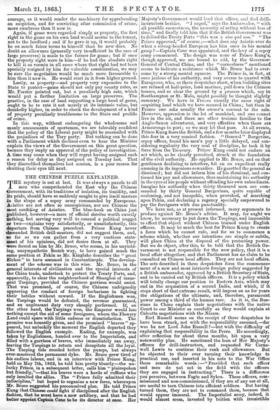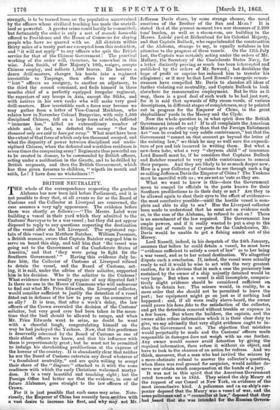THE CHINESE PUZZLE EXPLAINED. T HE mystery is out at last.
It was always a puzzle to all men who comprehended the East why the Chinese Government, with its traditions of isolation, its timidity, and its pride, should have so suddenly sought to give itself masters in the shape of a sepoy army commanded by Europeans. Atiatics are not often so unsuspicious, nor are Chinese the most confiding of Asiatics. The blue-book on China just published, however—a mass of official detritus worth exactly nothing, but serving very well to conceal a political nugget or two—explains very satisfactorily, or unsatisfactorily, this departure from Chinese precedent. Prince Rung never demanded British drill-masters, did not suggest them, and, so far as we can gather from a very cautious state- ment of his opinions, did not desire them at all. They were forced on him by Mr. Bruce, who seems, in his unyield- ing, unsympathetic Scotch way, to have gained much the same position at Pekin as Mr. Kinglake describes the "great Eichee " to have assumed in Constantinople. The develop- ment of the scheme was in this wise. Mr. Bruce, in the .general interests of civilization and the special interests of the China trade, undertook to protect the Treaty Ports, and, apparently, to clear the neighbourhood of Shanghai of insur- gent Taepings, provided the Chinese garrison would assist. That was promised, of course, the Chinese unfeignedly approving the conduct of foreign barbarians in fighting their battles without reward. If the Englishmen won, the Taepings would be defeated, the revenue guaranteed, and an unpleasant duty very cheaply performed. If on the other hand, the Taepings won, the Emperor would lose nothing except the aid of some foreigners, whom the Flowery Land could spare with little sadness or dissatisfaction. The promise was honestly given, and the promised " braves " ap- peared, but unluckily the moment the English departed they followed the English example. Reding, for example, was taken by Englishmen, handed over to the Imperialists, and Bled with a garrison of braves, who immediately ran away, leaving the Taepings to return and decapitate all the loyal. The Taeping tide receded before the pumps, but always over-mastered the permanent dyke. Mr. Bruce grew tired of his endless labour, and in an interview with Prince Rung, held on May 7th, 1862, he told him pretty bluntly—the un- lucky Prince, in a subsequent letter, calls him "plainspoken but friendly,"—that his braves were a horde of ruffians who only insulted the allies. The "Prince fully admitted their indiscipline," but hoped to organize a new force, whereupon Mr. Bruce suggested his preconceived plan. He told Prince Kung that Chinese could fight if disciplined after the English fashion, that he must have a new artillery, and that he had better appoint Captain Cane to be its director at once. Her Majesty's Government would lend that officer, and find drill- instructors besides. "I urged," says the Ambassador, "with all possible earnestness, the necessity of acting without loss of time," and finally told him that if the British Government was to defend the Treaty Ports "this was a sine qud non." "The Prince approved," of course ;—what does any Asiatic ever do when a strong-headed European has him once in his mental grasp ?—Captain Cane was appointed, and the levy of a sepoy army commenced. The design was none of Prince Kung's, though approved, we are bound to add, by the Governor- General of Central China, and the " earnestness " mentioned seems to indicate a resistance which Mr. Bruce had to over- come by a strong mental squeeze. The Prince is, in fact, at once jealous of his authority, and very averse to quarrel with Europeans, who, as these despatches show, when building sites are refused at half-price, land marines, pull down the Chinese houses, and so clear the ground by a process which, say in Southampton or St. Male, might possibly be thought slightly summary. We have in France exactly the same right of acquiring land which we have secured in China ; but then in France one asks usually the owner's consent to the sale. However, oppression is the lot of mankind, and one cannot live in the air, and there are other truisms familiar to the Anglo-Saxon adventurer, and very effective when there are Annstrongs in port; so we may let that pass. At all events, Prince Kung fears the British, and a few months later displayed this fear in a very comical fashion. " General " Burgevine, sepoy officer, found his men's pay a little delayed, and con- sidering regularity the very soul of discipline, he took it by force from the Treasury. Prince Kung could not endure an act which, as he clearly perceived, struck at the foundation of the civil authority. He applied to Mr. Bruce, and on that gentleman declining to interfere, bit on an expedient really amusing in its ingenious cowardice. He gazetted the general as dismissed ; but did not inform him of his dismissal, and con.- tinned his pay and allowances, thus maintaining his authority in the eyes of his people without offending his own subordinate. Imagine his authority when thirty thousand men are com- manded by thirty General Burgevines, quite capable of coalescing, and not incapable, when provoked, of marching upon Pekin, and declaring a regency specially empowered to pay the foreigners with due punctuality.
We have not, as at present informed, many arguments to produce against Mr. Bruce's advice. It may, for aught we know, be necessary to put down the Taepings, and impossible to effect that object without Chinese trained under English officers. It may be much the best for Prince Rung to create a force which he cannot rule, and for us to commence a scheme which, whether our intentions are simple or subtle, will place China at the disposal of the protecting power. But we do object, after this, to be told that the British Go- vernment is not responsible for the new policy, that it is a local affair altogether, and that Parliament has no claim to be consulted on Chinese local affairs. They are not local affairs. The acts described in these despatches form the commence- ment of a new and most intricate foreign policy suggested by a British ambassador, approved by a British Secretary of State, and to be carried out by British officers. It is a policy which will totally change our position in Eastern Asia, which may end in the acquisition of a second India, and which, if it stops short of that extreme result, will impose on us for years the obligations of the ultimate, and, therefore, paramount power among a third of the human race. As it is, the Rus- sians in China explain their negotiations with the native Court to our Minister as carefully as they would explain at Calcutta negotiations with the Nizam.
Earl Russell seems on the receipt of these despatches to have been struck, not with the responsibility assumed,—for was he not Lord John Russell ?—but with the difficulty of explaining that responsibility in the Peers. He accordingly, after reflection for about three months, hit upon a very noteworthy plan. He sanctioned the loan of Her Majesty's officers for drill-instructors, and requested Sir Come- wall Lewis to continue their rank and allowances. But he objected to their ever turning their knowledge to practical use, and inserted in his note to the War Office these remarkable words :—" Provided that such officer and men do not act in the field with the officers they are engaged in instructing." There is a difference you perceive, between Fagin and Sykes. These officers, com- missioned and non-commissioned, if they are of any use at all, are useful to turn Chinese into efficient soldiers. But having turned them, they are not to command them, because that would appear immoral. The Imperialist army, indeed, it would almost seem, invested by tuition with irresistible
strength, is to be turned loose orr the population unrestrained by the officers whose civilized teaching has made the uncivil- ized so powerful. A greater crime could hardly be committed; but fortunately the order is only a sort of amende honorable offered to Providence and the House of Commons for slaying people who have no quarrel with us. All districts within thirty miles of a treaty port are exempted from this restriction, and "it will not apply" to any officers who quit the British service for that of the Chinese Government ! The practical working of the order will, therefore, be somewhat in this wise. John Smith, of Her Majesty's 10th, resign, accepts Chinese employ, and collects 1,500 braves. He borrows a dozen drill-masters, changes his horde into a regiment irresistible to Taepings, then offers to one of the "lent" officers an ensigncy, to another an adjutancy, to the third the second command, and finds himself in three months chief of a perfectly equipped irregular regiment, the superiors of any troops in Asia, except the Sikhs, and with natives in his own ranks who will make very good drill-masters. How irresistible such a force may become we may gather from a letter of Vice-Consul Markham, who relates how in November Colonel Burgevine, with only 1,500 disciplined Chinese, fell on a large force of rebels, inflicted "immense loss," killed an extraordinary number of chiefs and, in fact, so defeated the enemy "that ten thousand only are said to have got away." What must have been the extent of that force of which only ten thousand escaped, and what the disparity of power between disciplined and undis- ciplined Chinese, when the defeated and worthless residuum is seven times the conquering army? Regiments thus powerful are to be created in dozens, to be commanded by British officers, acting under a notification in the Gazette, and to be drilled by British sergeants, and then the British Government, which has thus given firearms to children, " wipeth its mouth and saith, Lo! I have done no wickedness ! "































 Previous page
Previous page